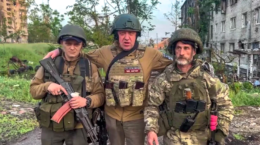The Problem with Mercenaries
Posted By Morris van de Camp On In North American New Right | Comments DisabledYevgeny Prigozhin, the flamboyant leader of the mercenary Wagner Group, launched a coup against the Russian government [2] on June 23, 2023 which began after he broadcast a video message over social media. His mercenaries captured Rostov-on-Don with little resistance, and then a column consisting of at least 5,000 men equipped with armor, field artillery, and air defenses marched towards Moscow. The group traveled north along the M4 highway, battled with attacking aircraft, and then stood down after a deal facilitated by Belarusian President Alexander Lukashenko. The Wagner Group’s “civil war” was over within a day.
Although Priogzhin and his men were accused of treason by Russian President Vladimir Putin, they have not been criminally charged and are being allowed to relocate to a new base in Belarus [3]. From there, they pose a threat to Ukraine’s northern border and Poland’s eastern frontier.
Winston Churchill said [4] that Russia was “a riddle, wrapped in a mystery, inside an enigma.” American diplomat George Kennan likewise wrote [5] that the situation in Russia during the early stages of the Cold War “involve[d] questions so intricate, so delicate, so strange to our form of thought, and so important to analysis of our international environment that [he could not] compress answers into single [sic] brief message without yielding to . . . a dangerous degree of over-simplification.”
In short, Russia is hard for outsiders to understand. It is difficult to determine what really happened in the Wagner Group’s mutiny. It could be that Prigozhin, on a high from his success in Bakhmut, really thought that he could seize power in Russia. He also might have been paid by foreign governments to start a civil war in Russia, but failed to generate popular support for his rebellion. Perhaps he took the money and double-crossed his paymasters. Or, perhaps he staged the entire thing in order to keep funds from the Russian military coming his way. Likewise, the entire event could have been a deception operation [6] to provide cover while a large force was moved into a position where it could threaten both Poland and Ukraine. Only the fullness of time will reveal the truth. But whichever is the case, it could be the tip of the iceberg of discontent within Russia, and more violence and instability will follow no matter what.
Russia is a difficult country to conquer. The Teutonic Knights [7], the Poles, the Swedes, the French, and the Germans have all made attempts to do it at various points in history, and all were soon defeated. Although there was one exception: In 1917 the German army captured most of the Russian Empire’s western holdings and then forced Moscow to sign the Treaty of Brest-Litovsk in March 1918 on terms that were greatly favorable to Germany and Austria-Hungary. The Central Powers didn’t pull this off via outright conquest, but were instead able to cut a deal with the Bolshevik government that replaced the Tsarist regime after the October 1917 Revolution. Lenin’s fledgling Communist government was weak and riven with hostile factions, and was thus in no position to bargain with the strong and well-organized German Empire.
In the ongoing Russo-Ukrainian War, the Ukrainian army is unlikely to reconquer all Russian-held territory by force of arms. But there is hope for victory through a palace coup in Moscow that replaces Putin, or a civil war that compels the Russian forces in Ukraine to withdraw. Since such a thing happened before in 1918, such a scenario has precedent.
The situations are not entirely comparable, however. In 1917, Russia had been unstable for decades. The Tsarist government had been the target of terrorism and assassinations since the mid-nineteenth century. This led to a revolution following Russia’s defeat in the Russo-Japanese War which was defeated, although the Tsar was greatly weakened by it. The Russian revolutionaries were able to apply the lessons they had learned in 1905 to ensure victory in 1917.
Prigozhin, for his part, has no discernible ideology, and his actions seem to be centered entirely on his personal beefs with officials in the Russian Ministry of Defense. The Wagner Group yielded to Putin’s government after very little fighting. To win without the need for battle is the ultimate victory, and the Russian military accomplished just that. The Russian forces in Ukraine likewise continued to hold their lines, and the Ukrainians made small, if any, advances during the uprising. The hope for the outbreak of a Russian civil war therefore seems highly improbable at present.
The Wagner Group is made up of two types of men. The first is convicts, who are used as shock troops, and such even the casualties among them [8] don’t negatively impact Russian society. The second is experienced veterans, who join up to avoid the hassles, additional duties, and bureaucracy of duty in the Russian army — not to mention to receive higher pay. Their professionalism won Bakhmut for Putin.
The Wagner Group’s rebellion is emblematic of the problem that all governments that field large, well-armed military forces face: the ever-present threat of a military coup. One of the major controversies of the George Washington administration was whether the United States should have a standing regular army or not. Public sentiment was not in favor of such a force at the time.
The ideal military was the Roman Republic’s. In the early years of Rome, the callused-handed Roman citizens would assemble on the Field of Mars [9] just after the crops were planted and go to war if necessary. The Roman army only recruited Roman citizens, and all social classes were expected to participate, while the patricians served as officers. Citizens who served were expected to bring their own weapons and armor. Promotion was based on merit, and enlistments ended when it was time to harvest the crops.
Since only Romans served, loyalty to Rome itself meant more to the soldiers than loyalty to any particular leader or political faction. It would have been unthinkable for the Roman Army to be disloyal to the Roman Republic. This worked until the Romans’ campaigns were being fought too far away for them to be concluded between planting and harvest. The citizen-soldiers involved in such deployments returned to unplowed fields, with little to live on. As a result, domestic political tensions increased. The Romans then reformed their system to create an army of volunteer professional soldiers, but this led the soldiers of the various legions to become beholden to their commanders, who could in turn could use his legions to advance his political career. In 88 BC, Roman General Lucius Cornelius Sulla used his army to capture Rome in order to advance his interests against his rival, Gaius Marius. Thereafter, the Roman Republic limped on until finally becoming an imperial dictatorship [10].
 [11]
[11]You can buy Greg Johnson’s You Asked for It here [12]
The Roman Empire’s military recruitment policy shifted to focus on enlisting mercenaries. The Empire’s northern frontier eventually came to be defended by Germanic mercenaries rather than Latin citizen-soldiers. In Britian, the Roman Britons recruited Anglo-Saxons. While this worked for a time, the Romans in the West were eventually overcome by their Germanic mercenaries due to ethnic rivalries.
Rome was far from the only government that ended up being defeated by its own mercenaries. For example, the Mamluk Sultanate in Egypt, Arabia, and the Levant was founded by slaves who had served as soldiers in the Ottoman army. Even in traditionally well-governed Britain, military men have sometimes been a threat. Oliver Cromwell [13] dissolved Parliament [14] and took power in London with help from a regiment of his New Model Army in 1653 [15]. Nor has the United States been immune: President Kennedy [16] feared a military coup, and as President sponsored a movie to warn of such a danger [17].
The Wagner Group is comprised mostly of ethic Russians, so a mutiny based on ethnic grievances is unlikely, but the threat of armed men influencing Russian domestic politics remains. The Russian army is not the army of the Roman Republic. To counter the threat of a military coup, a state needs two armies with two different chains of command.
The Soviet Union feared its military throughout its existence, and during Stalin’s era its government mitigated the problem by setting up a parallel set of officers backed by an armed internal security force that was loyal to the Communist Party called the People’s Commissariat for Internal Affairs (NKVD), and which was kept independent of the Red Army’s chain of command. All its orders had to be signed both by its commander as well as the Communist Party’s Political Officer. During the Second World War, retreating Red Army soldiers were often shot by NKVD [18] blocking units.
Mercenary forces are a double-edged sword. They can employ men who are otherwise unfit for military discipline and remove troublemakers from society. Such units can also be raised quickly. But ultimately, mercenary armies pursue their own interests rather than those of the state or the nation they allegedly serve. They also don’t have an incentive to provide law and order or to quickly end wars in which they are engaged. There is always the possibility that they will create the problem for which they will provide the solution — for a fee — as was seen in the Landsknecht [19] of the Thirty Years’ War [20].
The Wagner Group’s future is currently unclear. Russia’s position in Europe is actually being strengthened by having Wagner billeted in Belarus. It’s also possible that there might still be a genuine mutiny that could unravel Putin’s ability to rule or even a Russian civil war, although those eventualities might end up being worse than the current state of affairs. The mutiny could also possibly be the start of events which could lead to negotiations and peace, if Putin has been rattled enough.
* * *
Like all journals of dissident ideas, Counter-Currents depends on the support of readers like you. Help us compete with the censors of the Left and the violent accelerationists of the Right with a donation today. (The easiest way to help is with an e-check donation. All you need is your checkbook.)
Due to an ongoing cyber attack [21] from those who disagree with our political discourse, our Green Money echeck services are temporarily down. We are working to get it restored as soon as possible. In the meantime, we welcome your orders and gifts via:
- Entropy: click here [22] and select “send paid chat” (please add 15% to cover credit card processing fees)
- Check, Cash, or Money Order to Counter-Currents Publishing, PO Box 22638, San Francisco, CA 94122
- Contact [email protected] [23] for bank transfer information
Thank you for your support!
For other ways to donate, click here [24].
